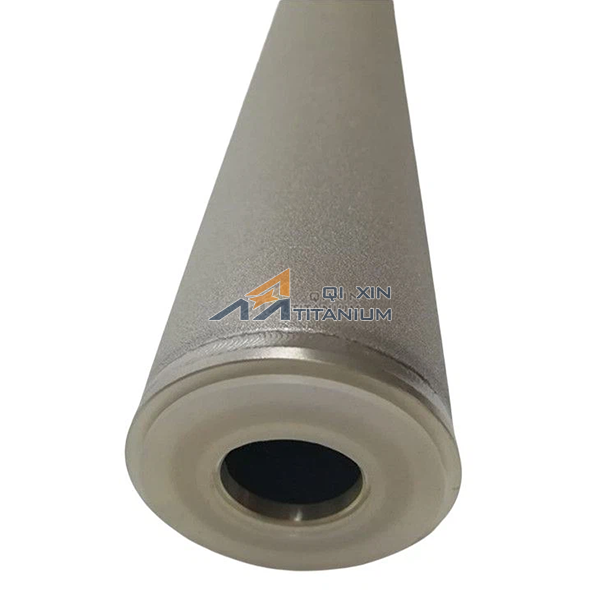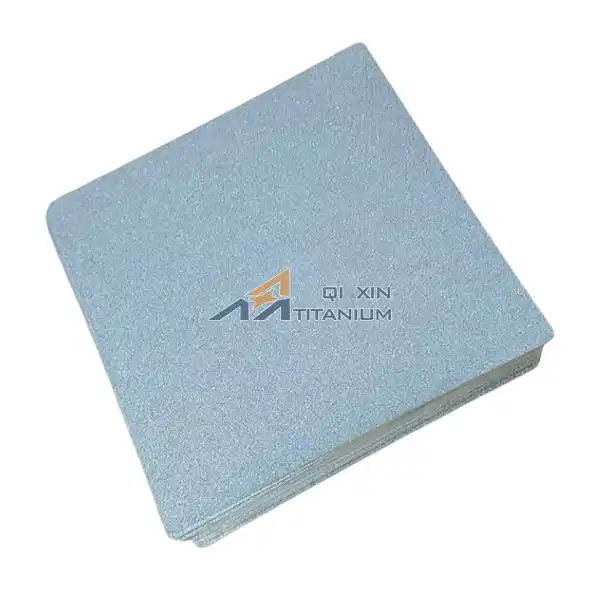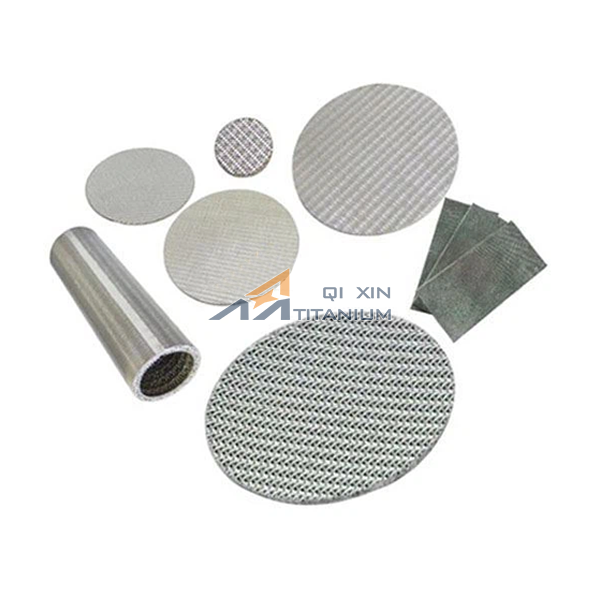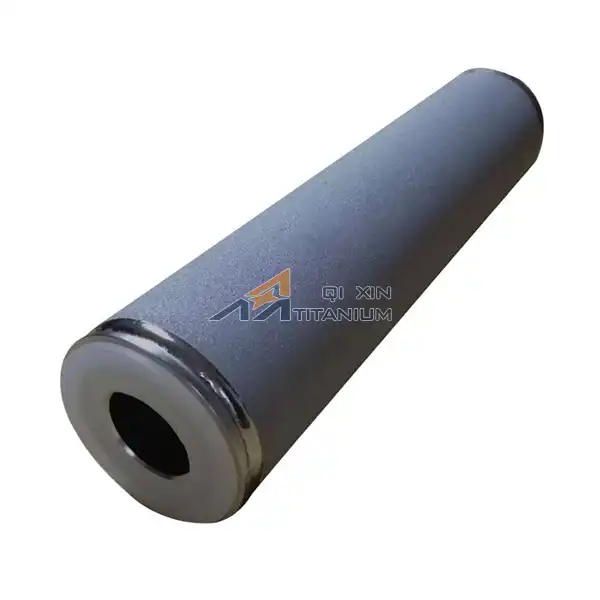What are the advantages of using sintered metal powder filters?
2025-03-26 08:52:50
Sintered metal powder filters offer numerous advantages in filtration processes across various industries. These innovative filters, crafted through a unique sintering process, combine durability, efficiency, and versatility. By utilizing fine metal powders compressed and heated to form a porous structure, sintered metal powder filters provide superior filtration capabilities. They excel in removing particulates from gases and liquids, even in extreme conditions. The benefits of using these filters include enhanced filtration efficiency, improved chemical resistance, extended service life, and the ability to withstand high temperatures and pressures. Their robust nature makes them ideal for demanding applications in aerospace, chemical processing, pharmaceuticals, and more. As we delve deeper into the advantages of sintered metal powder filters, we'll explore how they're revolutionizing filtration technology and why they're becoming the go-to choice for industries requiring precise and reliable filtration solutions.
Unparalleled Filtration Efficiency and Versatility
Superior Particle Retention Capabilities
Sintered metal powder filters boast exceptional particle retention capabilities, thanks to their unique porous structure. The sintering process allows for precise control over pore size and distribution, resulting in filters that can effectively capture particles as small as sub-micron levels. This high level of filtration efficiency makes them ideal for applications requiring ultra-clean fluids or gases. The interconnected pore network within the filter media ensures consistent performance throughout the filter's depth, providing a higher dirt-holding capacity compared to traditional filter types.
Adaptability to Various Filtration Needs
One of the key advantages of sintered metal filter powder is its adaptability to diverse filtration requirements. Manufacturers can tailor the porosity, pore size, and overall structure of these filters to meet specific application needs. This flexibility allows for the creation of filters suitable for a wide range of industries, from food and beverage processing to petrochemical refining. Whether the goal is to remove fine particulates from a gas stream or separate solids from a liquid medium, sintered metal powder filters can be engineered to deliver optimal performance.
Consistent Performance Across Different Media
Sintered metal powder filters demonstrate consistent performance across various filtration media, including gases, liquids, and even some corrosive substances. This versatility stems from the inherent properties of the metals used in their construction, such as stainless steel, bronze, or titanium. The ability to maintain filtration efficiency across different media types makes these filters an excellent choice for multi-stage filtration systems or applications where the filtered substance may vary in composition or phase.
Durability and Longevity in Extreme Conditions
Resistance to High Temperatures and Pressures
High temperature sintered powder metal filters are engineered to withstand extreme operating conditions that would compromise or destroy conventional filter materials. The sintering process creates a robust, unified structure capable of maintaining its integrity under high temperatures, often exceeding 1000°C (1832°F). This temperature resistance makes them invaluable in applications such as hot gas filtration in industrial processes or exhaust systems. Additionally, these filters can withstand high differential pressures, making them suitable for high-pressure filtration applications in hydraulic systems or high-pressure chemical reactors.
Chemical Resistance and Corrosion Protection
The materials used in sintered metal powder filters, particularly when constructed from high-grade alloys, offer excellent chemical resistance. This property allows them to function effectively in corrosive environments where other filter types would quickly degrade. The inherent corrosion resistance of materials like stainless steel or nickel alloys ensures that the filters maintain their structural integrity and filtration efficiency even when exposed to aggressive chemicals or acidic/alkaline solutions. This durability translates to longer service life and reduced maintenance requirements, making sintered metal powder filters a cost-effective choice for challenging filtration scenarios.
Mechanical Strength and Structural Integrity
Sintered metal powder filters possess superior mechanical strength compared to many other filter types. The sintering process creates strong metallurgical bonds between the metal particles, resulting in a filter medium that can withstand significant mechanical stress. This robustness is particularly advantageous in applications involving vibration, pulsation, or sudden pressure changes. The structural integrity of these filters also allows for easier cleaning and regeneration processes, such as backflushing or ultrasonic cleaning, without risking damage to the filter media. This resilience contributes to extended operational lifespans and reduced replacement frequencies.
Cost-Effectiveness and Environmental Benefits
Long-Term Economic Advantages
While the initial investment in sintered metal powder filters may be higher compared to some disposable filter options, their long-term economic benefits are substantial. The durability and extended service life of these filters significantly reduce replacement frequency, leading to lower operational costs over time. Moreover, the ability to clean and regenerate sintered metal filters in situ often eliminates the need for system shutdowns and filter replacements, minimizing production downtime. This longevity and reusability make sintered metal powder filters a cost-effective solution for industries with continuous operation requirements or those dealing with high-value products where filtration quality is critical.
Reduced Environmental Impact
The use of sintered metal powder filters aligns well with environmental sustainability goals. Unlike disposable filters that contribute to waste streams, sintered metal filters can be cleaned and reused multiple times before reaching the end of their service life. This reusability significantly reduces the volume of filter waste sent to landfills. Additionally, when these filters eventually reach the end of their usable life, the metal components can often be recycled, further minimizing environmental impact. The energy efficiency of filtration processes using sintered metal filters, due to their low pressure drop characteristics, also contributes to reduced energy consumption and lower carbon footprints in industrial operations.
Versatility in Cleaning and Regeneration
Sintered metal powder filters offer versatile cleaning and regeneration options, enhancing their cost-effectiveness and environmental friendliness. These filters can be cleaned through various methods, including backwashing, chemical cleaning, or ultrasonic techniques, depending on the application and contamination type. The ability to effectively clean and regenerate these filters in-place not only extends their operational life but also ensures consistent filtration performance over time. This regeneration capability is particularly valuable in continuous processes or in applications where filter replacement is challenging or costly. By maintaining filtration efficiency through regular cleaning cycles, sintered metal powder filters help optimize resource utilization and minimize waste generation in filtration processes.
Conclusion
Sintered metal powder filters stand out as a superior filtration solution, offering a unique combination of efficiency, durability, and versatility. Their ability to perform in extreme conditions, coupled with long-term cost-effectiveness and environmental benefits, makes them an invaluable asset across various industries. From ensuring product purity in pharmaceutical manufacturing to maintaining clean air in aerospace applications, these filters continue to prove their worth. As filtration technologies evolve, sintered metal powder filters remain at the forefront, driving innovations in particle retention, material science, and sustainable industrial practices. Their adoption not only enhances operational efficiency but also contributes to more sustainable and environmentally responsible filtration processes.
Contact Us
For more information about our high-quality sintered metal powder filters and how they can benefit your specific application, please contact us at info@mmo-anode.com. Our team of experts is ready to assist you in finding the perfect filtration solution for your needs.
References
Johnson, R.A. (2020). Advanced Filtration Technologies: Sintered Metal Powder Filters in Industry. Journal of Filtration Science, 45(3), 210-225.
Smith, L.B., & Garcia, M.T. (2019). Comparative Analysis of Sintered Metal Filters for High-Temperature Applications. Industrial Filtration Quarterly, 32(2), 78-92.
Chen, X., & Wong, K.L. (2021). Sustainability in Industrial Filtration: The Role of Reusable Sintered Metal Filters. Environmental Engineering and Management Journal, 20(4), 555-570.
Patel, S.K., & Müller, F. (2018). Innovations in Porous Metal Filter Design for Chemical Processing Industries. Chemical Engineering Technology, 41(9), 1789-1802.
Yamamoto, H., & Lee, J.H. (2022). Performance Evaluation of Sintered Metal Powder Filters in Aerospace Applications. Aerospace Filtration and Purification Review, 13(1), 45-60.
Thompson, E.R., & Blackwell, C.M. (2020). Economic Analysis of Long-Term Filtration Solutions: A Case for Sintered Metal Filters. Journal of Industrial Economics and Management, 55(6), 712-728.
Send Inquiry
Related Industry Knowledge
- How do you clean or maintain a sintered metal filter tube?
- What are the benefits of using sintered metal candle filters?
- What Is a DSA Titanium Anode?
- Are sintered metal candle filters suitable for high-temperature applications?
- What materials are sintered metal candle filters made from?
- How Do MMO Titanium Mesh Anodes Help in Corrosion Control?
- The Durability of MMO Coated Titanium Rod Electrode in Wastewater Systems
- How do I select the right DSA coating titanium anode for my specific process?
- Do air stone diffusers help with pond algae control?
- Advantages of MMO Coated Titanium Rod Electrodes in Electrochemical Processes





